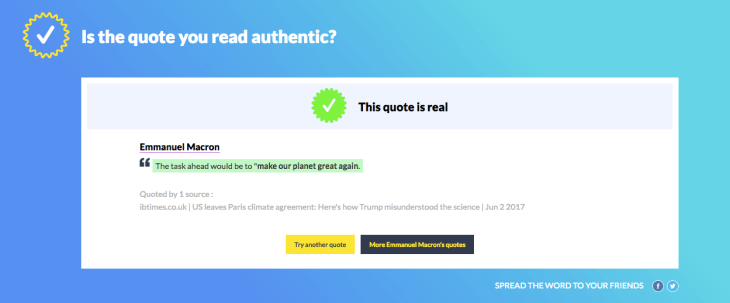On the internet no-one knows you’re a dog. And no-one knows whether that “fact” you’re reading — say, about President Putin’s pet dog having been trained to cock its leg at the word “trump” — is bona fide truth or more nonsense FAKE NEWS doing the rounds on Facebook.
All we can be really sure is that fake news has legs and runs at a blisteringly fast clip these days, thanks to massive engagement across vast social platforms engineered for digital spreading. In short, it’s a disorienting time for anyone trying to triangulate truth amid all these sneaking lies.
Which is where Storyzy wants to help out — with a just-launched quote verifier tool which, while it’s unlikely to be able to provide copper-bottomed reassurance for more obscure quotations across the full gamut of online media, might at least be able to give a thumbs up or down on words (apparently) uttered by higher-profile individuals, such as politicians, who are both widely covered in the mainstream media and widely targeted as the subjects of hoaxes.
Much socially spread fake news can hardly be accused of being subtle in its deceptions — indeed, wilder claims appear to be favored as a baiting strategy to spark more clicks — so mainstream quotation checking feels like a sensible place to try to fight back against mass misinformation.
The tool, which uses natural language processing to harvest quotations from its trusted media sources, is the work of a French team. They actually started on their idea back in 2012 — under a different name and with the rather more ambitious aim of building an “automated fact checking add on/overlay on every website,” says CEO and co-founder Stan Motte. An idea that was clearly a bit too ambitious. Hence resetting to focus on verifying quotations.
“We came to the conclusion that quotes are the only part of the news we can automatize at very large volumes and without any grey areas/discussions: “Did they say it or not?”, and the proof provided in every case (the source),” he says, via email.
They’re using a database of 5,000 — in their words — “reliable sources” from the mainstream media for verifying quotes (they display the source as part of the quote check). And, yes, their sources include The New York Times. So this tool is not going to please anyone who accuses the mainstream media of embedded bias…
But, in all truth, such folks probably aren’t the sort to think of using a quotation verifying tool in the first place.
Storyzy says it has a database of +15 million “authentic quotes” sourced from the mainstream media news since 2015 at this point.
Given that news is a dynamic medium, they’re crawling around 50,000 articles daily to add around the same number of additional quotes per day to keep up to speed with current affairs.
“It only took Storyzy a minute to display Macron’s quote last night (“make our planet great again”) reacting to Trump’s statement on the Paris Agreement,” adds Motte.
The verifier struggled when I tried it on some famed Trumpisms. But, for one thing, it’s not currently ingesting broadcast quotations — though Motte says the team is working on speech to text too. It also appears to get confused by partial quotes at times. Longer quotations with, say, small discrepancies in transcription may also confuse it. So it’s clearly far from perfect.
It’s been intentionally designed to flag up at least some of the issues as potential problems though, according to Motte, and will badge a quote as “dubious” if it can’t find it at all in its database, or “incomplete” if it’s not all there — linking the user to a full version of the quote via one of its media sources.
“Our Quote Verifier identifies if someone really said that or not or truncated. With the ambition to strengthen the reliability. Storyzy always provides multitude of sources per quote and allows users to have access to the full context of the quote,” he adds.
The quote checker is free to use, but the team’s hope is to spark interest from social platforms and search engines with a plan to propose an API for two scenarios: automatically flagging fake quotes before they have a chance to go viral, and for helping moderators identify fake content. “It is a huge cost,” adds Motte.
And just in case you were under the (false) impression fake digital news is a modern phenomenon, the team behind the tool was inspired as far back as 1999 — when they were producing digital news content for an ISP.
“We witnessed the increasing ‘bullshit’ in online news (explosion of number of sources, clickbaits, brandcontent…) so we wanted to develop a solution to help users overcome this problem,” he adds.
